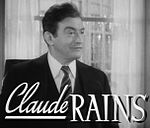
Invasion of the Body Snatchers is the fourth of twenty-one films under review by AMHF in relation to its mission. Of all the films covered or to be covered, it is unique. One, it is pure science fiction with a wholly supernatural element. Two, the psychiatrist is a minor character and himself winds up a […]
By:
Evander Lomke

On May 2, 2012, it will be sixty-five years since release of Miracle on 34th Street. But the film is hardly ready for retirement. It is one of twenty-one movies identified by AMHF for discussion relevant to the Foundation mission statement. Released one year before Dr. Stefan de Schill assumed directorship of research at AMHF, […]
By:
Evander Lomke

One of the anxiety disorders classified in the DSM-IV-TR is Social Phobia. This can be more deleterious than, say a snake phobia—a social phobia can cause withdrawal from so many important events in one’s life. Social phobia can include fear and avoidance of social situations because of fear of scrutiny and judgment. The person recognizes […]
By:
William Van Ornum, Ph.D.

What Freud called “free floating anxiety” is now known in the DSM-IV TR as Generalized Anxiety Disorder. It’s excessive worry that can’t be controlled by the person who is experiencing it. Symptoms may include restlessness, fatigue, difficulty concentrating, irritability, tension, and sleep disturbances; when several of these reach the point of interfering with an important […]
By:
William Van Ornum, Ph.D.

Now, Voyager is the second “psychiatry film” in this series of blogs on movies with themes or characters that are relevant to the mission of AMHF. Released almost seventy years ago (October 22, 1942), Now, Voyager, which gets its title from lines in a poem by Walt Whitman (“The Untold Want”), was something of a […]
By:
Evander Lomke
The December 22, 2011, edition of the New York Times brings out another article on the problems and abuses in New York State public groups homes where developmentally disabled persons reside. It is important to note that the focus of the NYT articles has been on “public” rather than private group homes. Many of the […]
By:
William Van Ornum, Ph.D.

Pope Benedict VI decries the increasing commercialization of Christmas. Indeed, readers of this blog remember that among the films with a strong psychological component, listed in a recent posting, is Miracle on 34th Street. This 1947 classic, though “AMHF-blog worthy” being about the workings of a therapist and a HRD “personality tester,” primarily takes up […]
By:
Evander Lomke

The following is based on interviews with Alexandra Styron. I first met Alexandra Styron at a reading of her new book, Reading My Father: A Memoir (Scribner, 2011). She was appearing at the Quogue Public Library on Long Island. It was one of those beautiful midsummer afternoons that remind one so much of Henry James’s […]
By:
Dr. Melissa Wanamaker

I came across this memoir (with its compelling title, somewhat reminiscent of the work of Clarice Lispector) upon learning its author, Carol Hebald, had been awarded (six years before) the same fellowship I had been given as an undergraduate. The foreword is by iconoclast Thomas Stephen Szasz, known for his anti-traditional “anti-views” of psychotherapy. In […]
By:
Evander Lomke
A stock market that swings erratically every few years is looking to be the new normal: Many even doubt that a ten-year horizon is a safe one for long-term investors or those planning retirement. Economic worries are real. They can be all-consuming. Yet, often unacknowledged is the role of one’s emotional experience in diluting or […]
By:
William Van Ornum, Ph.D.
Not to become or be considered hopelessly maudlin, though I am a bit of the nostalgic sort, I am this still Sunday afternoon, as the light shines a certain way, remembering our long-time director, Dr. Stefan de Schill, in a personal way. Long before I was invited to be on the board of directors of […]
By:
Evander Lomke
Previously we have written about Marsha Linehan, clinical psychologist who developed dialectical behavioral therapy, and who has worked throughout her career with persons who display severe suicidal behaviors or symptoms of what is called borderline personality disorder. On June 23, 2011, the New York Times presented an intriguing story, Expert on Mental Illness Reveals Her […]
By:
William Van Ornum, Ph.D.
This New York Times article on the state of talk-therapy in our time says it all. It is highly recommended to our readers. The article exposes many of the weaknesses in the field against which Dr. de Schill tirelessly campaigned. Welcome to the Brave New World of pills and revolving-door therapy. Money is in, and […]
By:
Evander Lomke
Under the direction of Dr. Stefan de Schill, covering the period January 1, 1949, to December 31, 1959, a research study was conducted regarding some 18,000 patients. This was a follow-up study of individuals not accepted for treatment by the Psychoanalytic Center, Inc., the then-clinical arm of AMHF. The subjects either appeared personally, or applied […]
By:
Evander Lomke
New York Times
By:
Evander Lomke
The New Yorker has run a fascinating article by Evan Osnos. Osnos covers China for the magazine, writing on other subjects like His Holiness the Dalai Lama. The article under review is about the Chinese meeting Sigmund Freud. As Dr. Stefan de Schill correctly predicted, there has been a resurrection of psychoanalysis. But it is […]
By:
Evander Lomke
Although this blog is not a forum for literary critiques and commentary, my recent four-month wrestling match with The Karamazov Brothers (the translator of the edition I found in my branch of the New York Public Library maintains it is as ridiculous to call the book “The Brothers Karamazov” as it is to refer to […]
By:
Evander Lomke
Forgiveness is a quality frequently preached about, talked about, and idealized: yet it may be very difficult to accomplish. The National Association of Social Workers has written about the value of forgiveness and how to bring this into one’s life. “Sometimes forgiveness is an important part of what a client wants to achieve in counseling. […]
By:
William Van Ornum, Ph.D.
Next to Normal is the bravest and one of the most talked-about Broadway musicals in years. It is recently the subject of an American Theatre Wing “Working in the Theatre” seminar. We highly recommend this landmark musical as a way, along with the efforts of AMHF, to raise public awareness about bipolar disorder and other […]
By:
Evander Lomke
Football star and bipolar disorder.
By:
Evander Lomke
In founding AMHF Books, the book-publishing arm of The American Mental Health Foundation, I along with our board sought two things. (1) To disseminate our knowledge in a way that also would preserve the lifework of the late Stefan de Schill. This would include books written in the spirit of Dr. de Schill’s work but […]
By:
Evander Lomke
The Dana Foundation and their News of the Brain.
By:
Evander Lomke
The New York Times today announced the death of Alice Miller. Dr. Miller is a writer in the psychoanalytic tradition who did not publisher her first book until her late forties and much experience in the field. The Gifted Child was the first of many books written by a first-class intellect who had the great […]
By:
William Van Ornum, Ph.D.
Have you heard of “Freudy-cats”? One of our AMHF board members, the distinguished publisher Jack Fowler, filled me in. These are people afraid of going into therapy. Why? And do you know any Freudy-cats?
By:
Evander Lomke
In 1953, the year the Rosenbergs were convicted in the electric chair, Esther Greenwood (a.k.a. Elly Higginbottom), poet Sylvia Plath’s alter ego (further complicating the picture, Plath wrote under the pen name “Victoria Lucas”), underwent electroshock therapy. Electricity, neurological connections, high-strung emotion, madness, suicide (which the real-life Plath committed ten years after the setting of […]
By:
Evander Lomke
Emily White is a lawyer who lived alone for six years in her 30s and said those were years of “savage loneliness.” She has written a book about this, “Lonely: A memoir”, just published by Harper Collins. Ms. White describes many of the pop psychology attitudes that even serious therapists adope. “Living alone gives you […]
By:
William Van Ornum, Ph.D.
“The problem with OCD,” John Eudes says, “is that it leads to a mode of perception and thinking that is too abstract, too narrow. God is life-giving, not a taskmaster or harsh judge of solitary behaviors, as OCD or scrupulosity suggests. To fight OCD, one has to develop other images and thoughts based on reality […]
By:
William Van Ornum, Ph.D.
As professionals in the mental-health fields try harder with cognitive behavior therapy and medications, over and over, one might imagine that this is a manifestation of the same mechanism of OCD. Where might other sources of help be found, especially for those suffering with scrupulosity? Can a Trappist monk, who is also a Georgetown-trained physician […]
By:
William Van Ornum, Ph.D.
I highly recommend Louis Menand in the March 1, 2010, issue of The New Yorker. In part, Menand writes: “Progress in medical science is made by lurching around. The best that can be hoped is that we are lurching in an overall good direction….The goal of biological psychiatry is to identify the organic conditions underlying […]
By:
Evander Lomke
One advantage of a blog is the expression of creative ideas, or at least new ideas, in a rapid way. So I will take advantage of this and hope there is at least a little creativity to be found in what follows. Personally written messages are becoming extinct. It is so much easier to dash […]
By:
William Van Ornum, Ph.D.
« Previous
1
2
3
Next »
















 Host Companion
Host Companion